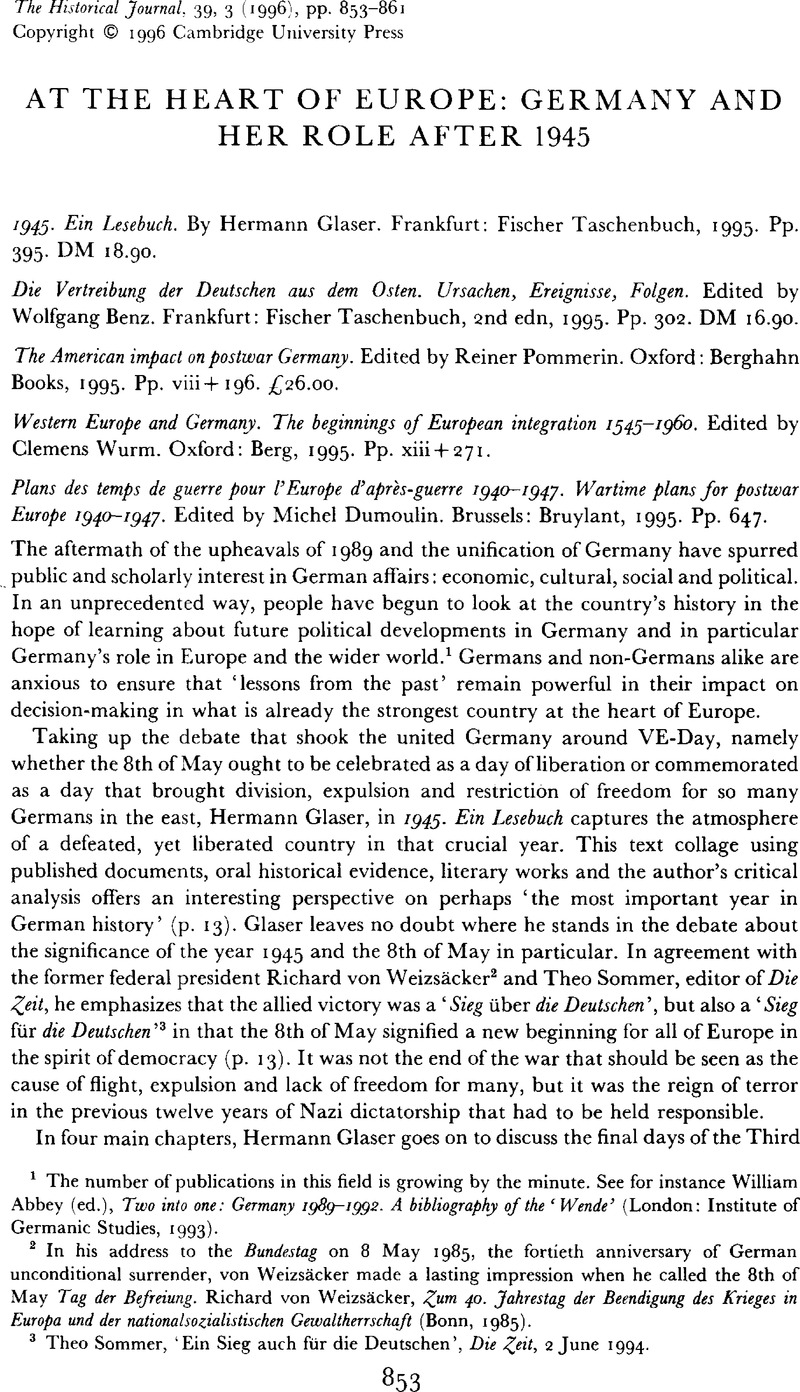No CrossRef data available.
Published online by Cambridge University Press: 11 February 2009

1 The number of publications in this field is growing by the minute. See for instance William, Abbey (ed.), Two into one: Germany 1989–1992. A bibliography of the ‘Wende’ (London: Institute of Germanic Studies, 1993).Google Scholar
2 In his address to the Bundestag on 8 May 1985, the fortieth anniversary of German unconditional surrender, von Weizsäcker made a lasting impression when he called the 8th of May Tag der Befreiung. Weizsäcker, Richard von, Zum 40. Jahrestag der Beendigung des Krieges in Europa und der nationalsoziahstischen Gewaltherrschaft (Bonn, 1985).Google Scholar
3 Theo, Sommer, ‘Ein Sieg auch für die Deutschen’, Die Zeit, 2 June 1994.Google Scholar
4 Erich, Kastner, ‘Das Dritte Reich bringt sich um. Die Leiche heißt Deutschland’, Notabene 1945. Ein Tagebuch, Gesammelte Schriften für Erwachsene (vol. VI, Munich, n.d.)Google Scholar
5 Hermann, Glaser, Kleine Kulturgeschichte der Bundesrepublik Deutschland. 1945–1989 (Munich, 1991), p. 18.Google Scholar
6 Hermann, Glaser, Kulturgeschichte der Bundesrepublik Deutschland (vol. 1, Zwischen Kapitulation und Währungsreform 1945–1948) (Frankfurt, 1986).Google Scholar
7 This cannot be said for all publications dealing with this theme. Works of Heinz, Nawratil (Vertreibungs-Verbrechen and Deutschen. Tatbestand, Motive, Bewältigung (Munich, 1982))Google Scholar, Emil, Franzel (Die Vertreibung. Sudentenland 1945/46 (Bad Nauheim, 1967))Google Scholar or Wilfried, Ahrens (Verbrechen an Deutschen. Dokumente der Vertreibung (Rosenheim, 1983))Google Scholar are only some examples of the apologetic nature of some historians with vested interests. In contrast, there are numerous books, written by refugees, which give a more balanced account and evaluation, such as Ferdinand, Seibt, Deutschland und die Tschechen. Geschichte einer Nachbarschaft (Munich, 2nd edn, 1993).Google Scholar
8 Rolf-Dieter, Miiller, Hitlers Ostkrieg und die deutsche Siedlungspolitik (Frankfurt/M., 1991)Google Scholar; Mechthild, Rössler and Sabine, Schleiermacher (eds.), Der ‘Generalplan Ost’. Hauptlinien der national-sozialistischen Planungs- und Vernichtungspolitik (Berlin, 1993).Google Scholar
9 See Documents on British policies overseas, Series I, I (London, 1984), 1117.Google Scholar
10 Bauer bases his account on his book Flüchtlingspolitik in Bayem 1945–1950 (Stuttgart, 1992)Google Scholar; Wiesemann draws, among others on his study of refugees and economic reconstruction ‘Flüchtlinge und wirtschaftlicher Wiederaufbau in der britischen Besatzungszone’, in Petzina, D. and Euchner, W. (eds.), Wirtschaftspolitik im britischen Besatzungsgebiet 1945–1949 (Dusseldort, 1984).Google Scholar
11 Schillinger fails to take into account even some of the early contributions to the debate such as: Rudolf, Fritz, Der Einfluß der Parteien und Gescädigtenverbände auf die Schadensfeststellung im Lastenausgleichsgesetz (Berlin, 1964).Google Scholar
12 See for instance ‘Charta der Vertriebenen’, published in Brües, Hans Josef, Artikulation und Repräsentation politischer Verbandsinteressen dargestellt am Beispiel der Vertriebenenorganisationen (Cologne, 1972).Google Scholar
13 For previous similar assessments see: Abelshauer, W., ‘West German economic recovery, 1945–1951. A reassessment’, Three Banks Review, IX (1982), 34–53Google Scholar; Hans-Peter, Schwarz, ‘Entscheidung für den Westen – Freiheit, Wiederaufbau, Souveränität, Sicherheit und Wiedervereinigung als Strukturelemente westdeutscher Außenpolitik 1949–1955’, in Funke, M., (ed.), Entscheidung fur den Westen: Vom Besatzungstatut zur Souveranitat der Bundesrepublik 1349–1955 (Bonn, 1988), pp. 8–37Google Scholar; Hans-Peter, Schwarz, ‘Adenauer und Europa’, Vierteljahresschrift für Zeitgeschichte, XXVII (1979), 471–523.Google Scholar
14 Bührer also heavily draws on previous research. See for example Wolfgang, Bührer, Ruhrstahl und Europa. Die Wirtschaftsvereinigung Eisen- und Stahlindustrie und die Anfänge der europäischen Integration 1945–1952 (Munich, 1986)Google Scholar, ‘Auftakt in Paris. Der Marshallplan und die deutsche Rückkehr auf die internationale Bühne 1948/49’, Vierteljahreshefte für Zeitgeschichte, 36 (1988), 529–56Google Scholar, and ‘Erzwungene oder freiwillige Liberalisierung? Die USA, die OEEC und die westdeutsche Außenhandelspolitik 1949–1952’, in Ludolf, Herbst, Werner, Bührer, Hanno, Sowade (eds.), Vom Marshallplan zur EWG. Die Eingliederung der Bundesrepublik Deutschland in die westliche Welt (Munich, 1990), pp. 139–62.Google Scholar
15 There have been some social histories of European integration, most notably parts of Kaelble's, study, A social history of Europe, 1880–1980 (Dublin: Savage, 1990)Google Scholar, Kaufmann, F. X., ‘Nationale Traditionen der Sozialpolitik und europaische Integration’, in Alberti, L. (ed.), Probleme und Perspektiven europaischer Einigung (Cologne, 1986)Google Scholar and Girault, R. (ed.), Indentité et conscience europeéennes au XXe siècle (Paris, 1993).Google Scholar
16 Walter, Lipgens, Documents on the history of European integration, vol. 1: Continental plans for European union 1939–1945 (Berlin, 1985).Google Scholar
17 His much fuller analysis is found in Detlef, Brandes, Großbritannien und seine osteuropäischen Alliierten 1939–1943. Die Regierungen Polens, der Tschechoslowakei und Jogoslawiens im Londoner Exil vom Kriegsausbruch bis zur Konferenz von Teheran (Munich, 1988).Google Scholar
18 Thierry, Grobois, L'idee europeéenne en temps de guerre (Louvain-La-Neuve, 1994).Google Scholar
19 Ermarth, M. (ed.), America and the shaping of German society (Oxford, 1993).Google Scholar